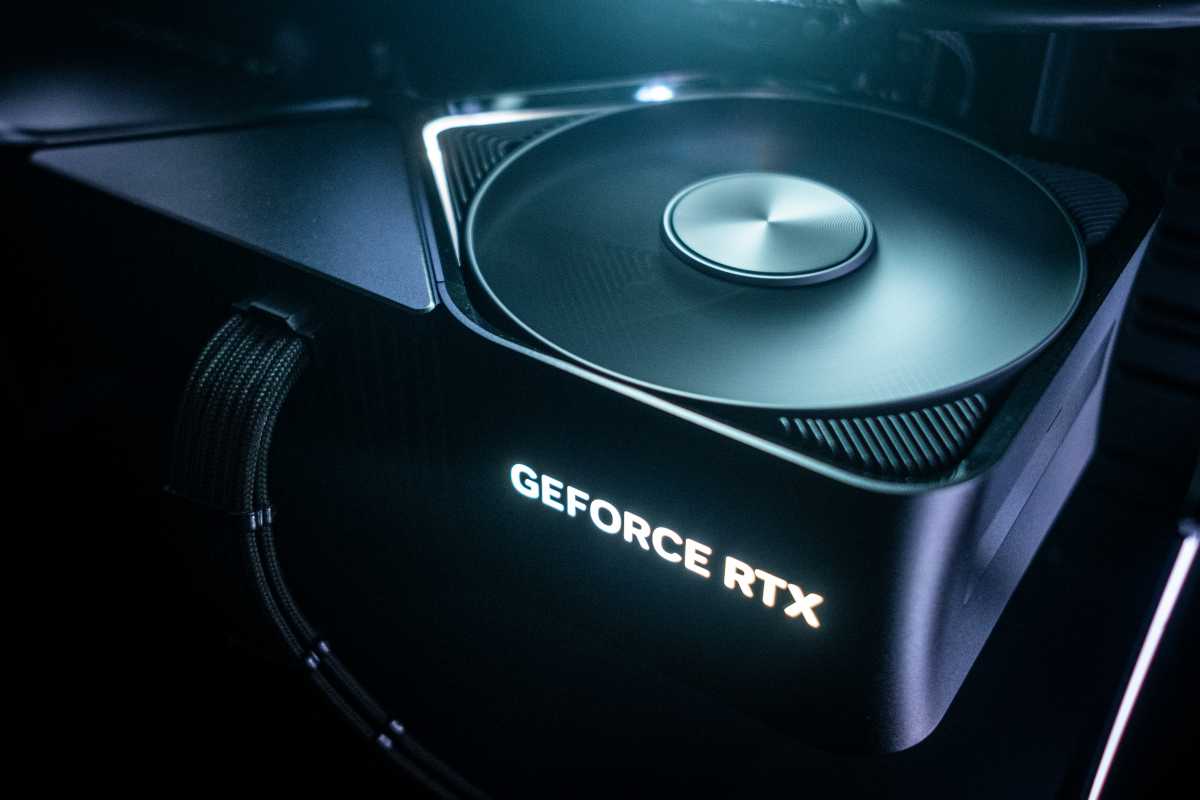Skip to content

Image: Adam Patrick Murray / IDG
A mere week after unveiling the GeForce RTX 4070 Super (and its siblings, the RTX 4070 Ti Super and 4080 Super) at CES 2024, Nvidia’s $599 graphics card is already primed to launch.
Review embargoes lifted for Nvidia’s new 1440p champion this morning ahead of a full release tomorrow morning. I’ve got the Founders Edition version of the card in hand but a severe case of the infamous post-CES plague prevented me from evaluating it fully. Fortunately, a host of other independent reviewers have done testing, and Nvidia’s latest GPU looks like a superstar.
Here are five things you need to know about the $599 GeForce RTX 4070 Super.
Super-sized performance boost
Nvidia’s biggest change to the GeForce RTX 4070 Super is the infusion of a whopping 20 percent more CUDA, ray tracing, and tensor cores in this new model, all at the same price as its vanilla namesake. Unsurprisingly, this results in a big boost in gaming performance:
“Averaged over the 25 games in our test suite, at 1440p, we find the RTX 4070 Super Founders Edition 15% faster than the RTX 4070 non-Super, which is a pretty substantial improvement for a refresh,” declares TechPowerUp, a margin substantiated by other reviewers. “This means that the card is able to match last generation’s RTX 3090 flagship, and the gap to RTX 4070 Ti shrinks to just 8%… While AMD’s Radeon RX 7800 XT was a bit faster than RTX 4070 in pure raster scenarios, this has changed with the RTX 4070 Super, which is now 7% faster.”
That’s a huge leap – and one that will no doubt help the RTX 4070 Super usurp the Radeon RX 7800 XT on our list of the best graphics cards. AMD’s rival often outpunched the RTX 4070 non-Super despite costing $100 less but that’s not the case with the Super.
Killer Nvidia performance-boosting AI technologies like DLSS, Frame Generation, and RTX Video Super Resolution can all push frame rates even further in games that support them. This is what the RTX 4070 should have been at launch.
Undisputed ray tracing champ
All those extra cores push the RTX 4070 Super’s ray tracing prowess to new heights, too.
“Ray tracing performance also scales similarly, at least when comparing the 4070 Super to the OG 4070 and the 4070 Ti,” KitGuru writes. “It is significantly faster than the RX 7800 XT over the eight games we tested with ray tracing enabled, to the tune of 47% on average, while it’s in the same class as the RX 7900 XTX.”
That’s a $1,000 AMD Radeon graphics card, for those keeping score. Ray tracing is a strength for Nvidia and the RTX 4070 Super pushes the pedal to the metal.
More power

Adam Patrick Murray / IDG
More power requires, well, more power. The GeForce RTX 4070 Super has its “total graphics power” rating bumped to 220 watts, 20W more than the vanilla 4070. It also transitions purely to Nvidia’s 16-pin power connector. It seems like a worthwhile sacrifice for the performance on offer.
Still made for 1440p
Even with all the extra grunt, this probably isn’t a graphics card to pick up for long-term 4K gaming. While the step-up RTX 4070 Ti Super moves to a beefier memory configuration with more capacity and a wider bus width, the RTX 4070 Super sticks to the same AD104 GPU as the vanilla version. That means it comes with 12GB of memory over a 192-bit bus – great specs for 1440p gaming, but lighter than you’d want for 4K with games becoming more memory-intensive almost by the day.
The OG 4070 is sticking around
Finally, while the 4070 Ti Super and 4080 Super’s releases signal the deaths of the graphics cards they’re replacing, Nvidia is keeping the original RTX 4070 around, but at a lower $549 price point. We’d expect retailers and board partners to push that down closer to $500 on the streets, where the vanilla RTX 4070 and its DLSS 3 advantage will be much more competitive with AMD’s Radeon RX 7800 XT.
Author: Brad Chacos, Executive editor

Brad Chacos spends his days digging through desktop PCs and tweeting too much. He specializes in graphics cards and gaming, but covers everything from security to Windows tips and all manner of PC hardware.
